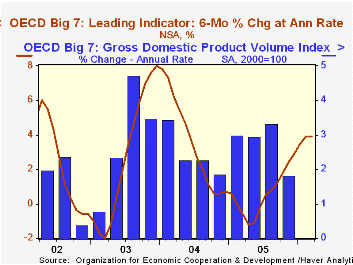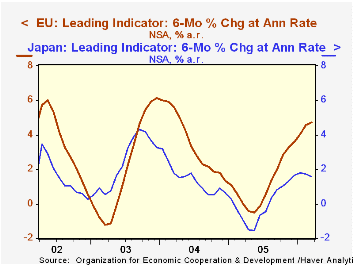 Global| May 15 2006
Global| May 15 2006Europe Led the OECD Leaders Up
by:Tom Moeller
|in:Economy in Brief
Summary
During March, the Leading Index of the Major 7 OECD economies increased another 0.2% after five consecutive months of 0.4% gain. The leaders' six month growth rate held at 3.9%, its best since early 2004. During the last ten years [...]

During March, the Leading Index of the Major 7 OECD economies increased another 0.2% after five consecutive months of 0.4% gain. The leaders' six month growth rate held at 3.9%, its best since early 2004.
During the last ten years there has been a 64% correlation between the change in the leading index and the q/q change in the GDP Volume Index for the Big Seven OECD countries.
Leaders in the European Union (15 countries) rose 0.4% on top of an upwardly revised 0.5% February rise. That improved the index's six month growth rate to 4.7%, the best since April 2004. During the last ten years there has been a 59% correlation between the change in the leading index and the quarterly change in the European Union GDP volume index.
The 0.7% rise in theGerman leading index continued the trend of strong gain that started just under a year ago. The six month growth rate now is up to 8.4%, the highest level since December 2003, as the business climate indicator continued to surge along with new orders. Inventories fell to a record low versus trend. During the last ten years there has been a 32% correlation between the change in the German leading index and the quarterly change in GDP volume.
A leaders in France ticked up 0.1% and left the series' six month growth rate at a firm 3.9%. The industrial sector's prospects improved along with the future tendency of production. New car registrations rose but new job prospects & consumer confidence remained depressed.
The Italian leading index fell for the first time since last July. The 0.1% decline eased the series' six month growth rate to a still-improved 1.3%. New orders surged & the future tendency of production rose but consumer confidence remained depressed.
A 0.2% rise in the U.S. leaders was the slimmest gain since last September. Nevertheless, six month growth in the leaders was a firm 4.8% as share prices surged and the business climate indicator improved. The correlation between the leaders' growth rate and real GDP growth has been a high 73% during the last ten years.
The UK leaders jumped 0.6% after two months of small gain and improved the six month growth rate to 1.3%, its best since mid-2004. Share prices and the future tendency of production surged.
The Canadian leaders improved 0.3% following a 0.1% decline in February that was very much downwardly revised. The six month growth rate stood at still-improved 2.4%. The correlation of the leaders' growth with Canadian real GDP has been 49% during the last ten years.
The leading index in Japan was unchanged in March for the second consecutive month. That dropped the index's six month growth rate to 1.6%, its lowest since November. Share prices and loans-to-deposits were firm but imports versus exports fell to a twenty year low. The leaders' correlation with Japan's real economic growth has been a meaningful 40% during the last ten years.
The latest OECD Leading Indicator report is available here.
Recent Volatility Trends in the Foreign Exchange Market from the Federal Reserve Bank of New York can be found here.
| OECD | Mar | Feb | Y/Y | 2005 | 2004 | 2003 |
|---|---|---|---|---|---|---|
| Composite Leading Index | 105.28 | 105.03 | 2.1% | 102.75 | 102.40 | 97.87 |
| 6 Month Growth Rate | 3.9% | 3.9% | 0.6% | 3.6% | 2.8% |
Tom Moeller
AuthorMore in Author Profile »Prior to joining Haver Analytics in 2000, Mr. Moeller worked as the Economist at Chancellor Capital Management from 1985 to 1999. There, he developed comprehensive economic forecasts and interpreted economic data for equity and fixed income portfolio managers. Also at Chancellor, Mr. Moeller worked as an equity analyst and was responsible for researching and rating companies in the economically sensitive automobile and housing industries for investment in Chancellor’s equity portfolio. Prior to joining Chancellor, Mr. Moeller was an Economist at Citibank from 1979 to 1984. He also analyzed pricing behavior in the metals industry for the Council on Wage and Price Stability in Washington, D.C. In 1999, Mr. Moeller received the award for most accurate forecast from the Forecasters' Club of New York. From 1990 to 1992 he was President of the New York Association for Business Economists. Mr. Moeller earned an M.B.A. in Finance from Fordham University, where he graduated in 1987. He holds a Bachelor of Arts in Economics from George Washington University.
More Economy in Brief
 Global| Feb 05 2026
Global| Feb 05 2026Charts of the Week: Balanced Policy, Resilient Data and AI Narratives
by:Andrew Cates






